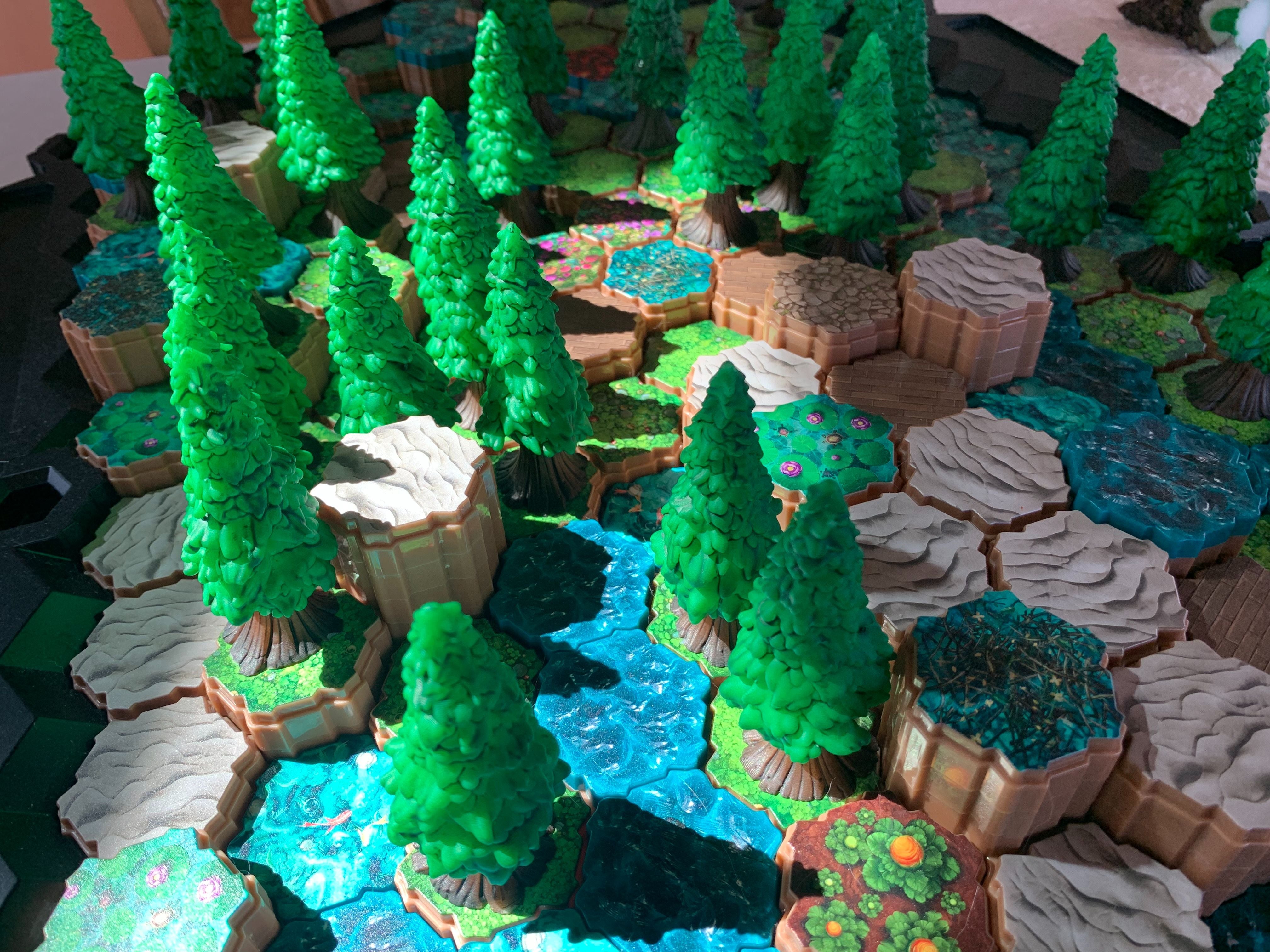The Resurgence of Tabletop Gaming in a Digital Age
In an era dominated by screens and digital entertainment, board games have experienced a remarkable renaissance. This resurgence isn't merely nostalgia – it represents a fundamental human desire for face-to-face interaction, tactical thinking, and shared experiences that digital alternatives simply cannot replicate. Popular board games have evolved dramatically from the classics many remember from childhood, now offering immersive worlds, intricate strategy systems, and design elements that rival digital productions in their sophistication.
Today's tabletop landscape encompasses an extraordinary spectrum – from accessible party games that bring newcomers to the table, to complex strategy epics that challenge even the most seasoned players. The tactile nature of physical components – the satisfying clack of tokens, the shuffle of cards, the strategic placement of miniatures – creates a multisensory experience that resonates on a deeper level than virtual alternatives.
- Unlock Hours of Fun with These Must-Try Popular Board Games
- The Resurgence of Tabletop Gaming in a Digital Age
- The Psychological Benefits of Analog Play
- Settlers of Catan: The Gateway to Modern Gaming
- Ticket to Ride: Connecting Routes and Players
- Immersive Narrative-Driven Experiences
- Gloomhaven: The Campaign Revolution
- Pandemic Legacy: Consequences that Matter
- Cooperative Challenges for Team-Based Play
- Spirit Island: Reversing Colonial Narratives
- Pandemic: Global Crisis Management
- Creating Your Own Gaming Experiences
- The Rise of Player-Generated Content
- From Player to Designer: The Creative Journey
- The Future of Tabletop Gaming
- Technology Integration and Mixed Reality
- Community-Driven Innovation
- Conclusion: The Renaissance of Shared Play
As communities increasingly seek meaningful connections away from screens, board games provide the perfect nexus of entertainment, social interaction, and intellectual engagement. They foster camaraderie through collaborative problem-solving while simultaneously creating space for friendly competition that strengthens rather than strains relationships. This perfect balance has contributed significantly to their enduring appeal across generations and demographics.
The Psychological Benefits of Analog Play
The cognitive advantages of board gaming extend far beyond mere entertainment. Regular engagement with tabletop games has been linked to enhanced critical thinking, improved pattern recognition, and heightened decision-making capabilities. The necessity to plan multiple moves ahead while adapting to opponents' strategies exercises the prefrontal cortex in ways that many digital experiences simply cannot match.
Perhaps more significantly, the face-to-face nature of board gaming cultivates emotional intelligence and social awareness. Players must read expressions, negotiate alliances, and navigate interpersonal dynamics – all crucial skills that translate directly to real-world scenarios. The shared experience creates a unique social bond, reinforcing connections through both triumphs and setbacks around the gaming table.
Settlers of Catan: The Gateway to Modern Gaming
Few games have transformed the landscape of tabletop gaming as profoundly as Settlers of Catan (now simply known as Catan). Released in 1995, this German-designed masterpiece introduced millions to the concept of Eurogames – titles characterized by indirect player interaction, economic systems, and resource management rather than direct conflict.
Catan's brilliant innovation lies in its variable board setup, ensuring no two games unfold identically. Players compete to establish settlements on an island of hexagonal terrain tiles, each producing different resources. The ingenious trading mechanic ensures constant player engagement, as negotiations become central to strategy. Even when it's not your turn, you remain actively involved in the unfolding drama.
The game's elegant resource production system – determined by dice rolls linked to specific terrain hexes – creates a perfect balance of strategy and chance. This accessibility, combined with meaningful decisions at every turn, explains why Catan has sold over 30 million copies worldwide and remains the quintessential gateway to the broader world of hobby board gaming.
"Catan didn't just change games – it changed how we play together. It showed us that strategic depth and accessibility aren't mutually exclusive, creating a blueprint for modern game design that prioritizes player agency and interaction." – Klaus Teuber, Creator of Catan
Ticket to Ride: Connecting Routes and Players
Ticket to Ride emerged in 2004 as another pillar of accessible strategy gaming. This railway-themed masterpiece by designer Alan R. Moon exemplifies elegant simplicity – players collect colored cards to claim railway routes across various maps, fulfilling secret destination tickets for additional points.
The game's genius lies in its perfect equilibrium between strategy and accessibility. New players can grasp the rules within minutes, yet the tactical depth engages experienced gamers through multiple sessions. The tension between claiming visible routes and concealing your ultimate objectives creates a satisfying psychological element absent in purely mechanical games.
With over 6 million copies sold and more than a dozen geographical expansions spanning from Nordic countries to India, Ticket to Ride has established itself as a perennial favorite. Its combination of approachable mechanics, strategic depth, and gentle competition makes it ideal for introducing newcomers to the hobby while remaining engaging for veterans.
Immersive Narrative-Driven Experiences
The evolution of board games has increasingly emphasized storytelling elements that transform game sessions into cinematic adventures. These narrative-driven experiences blend mechanical innovation with thematic immersion, creating memories that resonate long after the game concludes.
These story-rich games demonstrate that tabletop experiences can rival video games in their narrative depth while offering something unique – a collaborative storytelling environment where players physically interact with both the game and each other. This tangible connection creates a more profound emotional investment in the unfolding narrative.
Gloomhaven: The Campaign Revolution
Gloomhaven represents the pinnacle of campaign-based board gaming, offering an unprecedented 100+ hours of interconnected scenarios in a persistent fantasy world. Designer Isaac Childres created a tabletop experience that combines the depth of a role-playing game with the structured gameplay of a tactical board game, all without requiring a game master.
Players control adventurers with unique ability decks, navigating through challenging dungeon scenarios where card management becomes crucial. The revolutionary stamina system forces strategic choices – powerful abilities exhaust your character faster, creating constant tension between immediate impact and longevity.
What truly distinguishes Gloomhaven is its legacy elements – the world evolves based on player decisions, with new locations unlocking, characters retiring, and scenarios changing permanently. This creates a personalized narrative arc that unfolds across dozens of sessions, with players genuinely investing in both their characters and the world they inhabit.
Pandemic Legacy: Consequences that Matter
Pandemic Legacy transformed cooperative gaming by introducing permanent consequences to player decisions. Building upon the foundation of the original Pandemic (where players collaborate as disease-fighting specialists), Legacy introduces narrative developments that permanently alter the game state – cards are destroyed, components are modified, and rules evolve over a year-long campaign.
The emotional impact of these permanent changes cannot be overstated. When a beloved character dies or a city falls into chaos permanently, players experience genuine loss. Conversely, breakthroughs and victories feel tremendously rewarding, knowing they'll benefit future sessions. This emotional investment explains why Pandemic Legacy: Season 1 held the coveted #1 position on BoardGameGeek's rankings for years.
The legacy concept pioneered here has influenced countless subsequent designs, demonstrating how board games can create emotional narratives with lasting consequences – something digital games typically simulate but rarely implement with such finality.
Cooperative Challenges for Team-Based Play
While competitive games dominate much of gaming history, cooperative board games have surged in popularity, offering experiences where players unite against the game system itself. These collaborative challenges foster communication, strategic coordination, and shared problem-solving in ways that competitive games cannot.
Cooperative games particularly excel at creating memorable moments where the entire table collectively holds their breath as a crucial die roll or card draw determines success or failure. The shared triumphs feel more significant when achieved together, while defeats become learning experiences rather than sources of interpersonal friction.
Spirit Island: Reversing Colonial Narratives
Spirit Island represents a revolutionary departure from traditional board game themes. Rather than controlling colonizers expanding into new territories (a common board game trope), players embody powerful nature spirits defending their island from invading settlers. This thoughtful inversion of colonial narratives has resonated strongly with modern audiences seeking more nuanced thematic experiences.
Mechanically, Spirit Island offers asymmetric gameplay at its finest – each spirit possesses entirely unique abilities, powers, and playstyles. Some concentrate on defensive protection, others on elemental destruction, while others manipulate the fear that drives invaders away. This asymmetry ensures remarkable replayability as mastering each spirit requires distinct strategic approaches.
The game's intricately designed AI system manages invader expansion through a deterministic card system, creating predictable yet challenging patterns that require careful coordination to counteract. The escalating difficulty curve perfectly balances accessibility with long-term depth, earning Spirit Island its reputation as the thinking person's cooperative game.
Pandemic: Global Crisis Management
Few cooperative games have achieved the cultural penetration of Pandemic, a tense race against time as players work together to prevent global disease outbreaks. Designer Matt Leacock created a masterpiece of accessible cooperative gameplay that has introduced countless players to modern board gaming.
The game's brilliance lies in its elegantly straightforward turn structure combined with brutally difficult decisions. Each player assumes a specialized role with unique abilities, creating natural interdependence that fosters genuine teamwork. The escalating crisis – facilitated through the infection deck's acceleration mechanism – generates mounting tension as previously infected cities become increasingly vulnerable to catastrophic chain reactions.
Pandemic's perfect calibration of difficulty ensures that victories feel earned rather than guaranteed, generating the addictive "just one more game" sensation that characterizes the best tabletop experiences. Its accessibility has made it a staple in many collections, serving as an ideal introduction to cooperative gaming concepts.
While strategic depth defines many modern classics, party games fulfill an equally important role in the gaming ecosystem. These accessible, socially-oriented experiences prioritize laughter and interaction over complex rules, making them perfect for diverse groups and casual gatherings.
Creating Your Own Gaming Experiences
While experiencing established games provides tremendous enjoyment, the hobby has increasingly embraced player creativity through customization, modification, and original design. This maker aspect of modern board gaming allows enthusiasts to transition from passive consumers to active creators, shaping experiences that reflect their unique vision.
- Custom scenarios for existing games extend replayability while allowing exploration of new narrative directions
- Homemade components – from painted miniatures to 3D-printed organizers – personalize the physical experience
- Digital design tools democratize game creation, providing accessible platforms for prototyping and iteration
- Community platforms facilitate sharing of fan-created content, creating ecosystem of continuous innovation
The barrier between professional and amateur design continues to erode as crowdfunding platforms and print-on-demand services provide viable publication paths for independent creators. This democratization of game design has led to an explosion of innovative concepts that might never have emerged through traditional publishing channels.
The Rise of Player-Generated Content
The open-source movement has profoundly influenced modern board gaming, with communities developing expansions, variants, and entirely new games based on existing systems. Digital platforms facilitate sharing these creations, creating vibrant ecosystems where official and fan-created content coexist and enhance each other.
Tabletop Simulator and similar digital platforms have further accelerated this trend, allowing designers to prototype and playtest concepts with global communities before committing to physical production. This iterative development process, incorporating feedback from diverse player perspectives, often results in more refined final products.
The crossover between digital and physical gaming continues to evolve, with augmented reality applications enhancing traditional board game experiences. These hybrid approaches maintain the tactile satisfaction of physical components while leveraging digital tools for rules management, hidden information, or narrative enhancement.
From Player to Designer: The Creative Journey
Many of today's most successful game designers began as enthusiastic players whose desire to modify existing games eventually led to original creations. This transition from consumer to creator represents one of the most rewarding aspects of the hobby, as personal vision transforms into shared experiences that others can enjoy.
The iterative design process teaches valuable skills beyond gaming itself – project management, critical analysis, communication of complex systems, and the ability to incorporate feedback constructively. These transferable capabilities often benefit professional development even for those who never publish commercially.
Community support remains essential for aspiring designers, with numerous resources available for those beginning their creative journey. From design contests that provide structured challenges to mentorship programs connecting veterans with newcomers, the board game community actively nurtures new voices and perspectives.
The Future of Tabletop Gaming
The board game industry continues to evolve at an unprecedented pace, with emerging technologies, changing demographics, and shifting consumer preferences reshaping the landscape. Understanding these trends provides valuable context for players navigating this dynamic hobby.
The fundamental appeal of board gaming – meaningful face-to-face interaction around shared experiences – remains constant even as the medium itself transforms. This core value proposition explains why the industry has demonstrated remarkable resilience even as digital entertainment options proliferate.
Technology Integration and Mixed Reality
The boundary between digital and analog gaming continues to blur, with hybrid experiences leveraging the strengths of both mediums. App-assisted board games utilize digital tools to manage complex systems, track hidden information, or deliver narrative content while maintaining the tactile satisfaction of physical components. This approach enables gameplay experiences that would be impractical or impossible with purely analog systems.
Augmented reality applications increasingly enhance traditional board gaming, overlaying digital content onto physical game spaces. These innovations maintain the social dynamics and tactile elements that define tabletop gaming while incorporating visual effects, animation, and interactive elements previously exclusive to video games. The resulting hybrid experiences appeal to players seeking the best of both worlds.
3D printing technology has revolutionized component customization, allowing players to create bespoke pieces that enhance both functionality and aesthetic appeal. As these technologies become more accessible, the line between consumer and creator continues to erode, with players actively participating in the evolution of their favorite games through custom components, storage solutions, and game modifications.
Community-Driven Innovation
The democratization of game publishing through crowdfunding platforms has fundamentally altered industry dynamics, enabling direct connections between designers and players while bypassing traditional gatekeepers. This direct relationship facilitates more specialized and innovative designs that might never reach production through conventional channels due to perceived market limitations.
Open-source design philosophies increasingly influence modern game development, with designers explicitly creating systems intended for community modification and expansion. This collaborative approach between professional creators and enthusiast communities generates a rich ecosystem of content that extends the lifespan and appeal of core systems.
Digital platforms facilitate global playtesting communities that provide feedback throughout the development process, resulting in more refined final products. This iterative approach, incorporating diverse perspectives before publication, allows designers to identify and address potential issues that might otherwise emerge only after retail release.
Conclusion: The Renaissance of Shared Play
The extraordinary resurgence of board gaming represents far more than a mere trend – it signals a profound shift in how people seek meaningful connection in an increasingly digital world. Popular board games provide unique vehicles for authentic interaction, intellectual engagement, and shared narrative experiences that simply cannot be replicated through screens.
As technology becomes ever more pervasive, the deliberate choice to gather around a table for analog play makes a powerful statement about priorities and values. The tangible components, face-to-face interaction, and shared physical space create a distinctly different experience from digital alternatives – not superior or inferior, but fundamentally different in ways that fulfill distinct human needs.
The future of tabletop gaming looks remarkably bright as new generations discover the unique satisfaction of analog play while veterans continue exploring innovative designs. The creative conversation between designers and players continues to evolve, generating experiences of extraordinary diversity and richness across the spectrum from accessible party games to complex strategic epics.
Whether you're a seasoned enthusiast with hundreds of plays under your belt or a curious newcomer taking your first steps into this vibrant hobby, the tabletop renaissance offers unprecedented opportunities for connection, challenge, and creativity. The humble board game has transformed from simple family entertainment into a sophisticated medium for expression, interaction, and shared adventure – a remarkable evolution that shows no signs of slowing.




View Comments
Conquer and Craft: A Dive into the World of Wargaming and Miniatures
Miniatures On-Demand: 3D Print Technology Changes Everything
Are there any that I left out? Let me know in the comments.